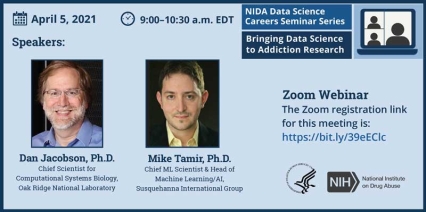Details
Contact
Meeting Summary
View the Webinar:
Additional Information
NIDA will be hosting a 4-part Data Science careers seminar series this spring titled Bringing Data Science to Addiction Research. The goal of this seminar series is to highlight the career paths of prominent data scientists and inspire a new generation of data science researchers who focus on addiction.
This series will take place on the following dates from 9:00-10:30am EDT (Please note that this is during Daylights Savings Time): March 15th, March 22nd, March 29th, and April 5th.
The final seminar will have two speakers, Dr. Mike Tamir and Dr. Dan Jacobson, on April 5th from 9:00-10:30am EDT.
Biographies
Mike Tamir, Ph.D., serves as Chief ML Scientist and Head of Machine Learning for SIG, UC Berkeley Data Science faculty, and Director of Phronesis ML Labs. He has led teams of Data Scientists in the bay area as Head of Data Science at Uber ATG, Chief Data Scientist for InterTrust and Takt, Director of Data Science for MetaScale/Sears, and CSO for Galvanize where he founded the galvanizeU-UNH accredited Masters in Data Science degree and oversaw the company's transformation from co-working space to Data Science organization. Mike began his career in academia serving as a mathematics teaching fellow for Columbia University before teaching at the University of Pittsburgh.
Dan Jacobson, Ph.D., is the Chief Scientist for Computational Systems Biology at Oak Ridge National Laboratory, home to some of the world’s largest supercomputers; his lab uses petascale and exascale computing to analyze and model complex biological systems and they were the first to break the exascale barrier. . His research focuses on understanding the complex sets of interactions of molecules of all types (across all omics layers) in cells that lead to phenotypes, traits and disease states in organisms and how all of that is conditional on the surrounding environment, and his team applies these approaches to grand challenges in a number of areas. Dan's lab is also doing a range of research to address the COVID-19 pandemic.


